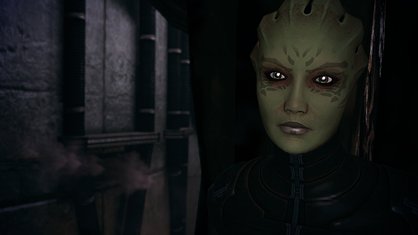The BioWare Technique
The devs talk about writing the company's RPG classics
Creating entertaining, involving dialogue for characters is a major element of making a role-playing game, with characters such as KOTOR’s killer robot HK-47 and his immortal line, “I am most eager to engage in some unadulterated violence.” However, when asked about writing speech for games, Karpyshyn is brutally honest in his assertion that “dialogue is so often one of the last things we do! There’s so much you have to do before starting on the dialogue, especially with a new game like Jade Empire, as you have to establish the world. So for Mass Effect we spent about nine months planning everything out before we started to lock down characters or the story. It’s trying to establish what’s your setting, what’s the tone, your art style, and your narrative style.”
Laidlaw adds that it’s important that writers also ensure they ask themselves what the game is actually about: “You have to think what are we trying to do? What are we trying to say? What is the point of this story? If you think about Mass Effect, a prime theme of the game is ‘Is it us versus them, or is it us with them?’, which could very easily be carried into an allegory for modern times. It helps us set a purpose for the story and the characters.”

BioWare create character bibles for most of the personalities in their games, and settle on three levels of importance - major, medium and minor. “Minor characters are typically the barkeep, where I’m not so worried about his family history, as in any interesting personality quirks he has - he’s short and round, maybe has asthma...” says Laidlaw. “But as a character grows in significance to the story we flesh them out a lot further, largely because we want these characters to be 3D, to resonate properly. You have to make sure that they have enough depth to go beyond [does lame tough guy voice] ‘I am a guy with a gun!’ The bibles then allow the artists to get a real grasp on the characters so they can then come in and provide concept art and models, and give their feedback. Quite often you’ll find they actually take what you were doing and emphasise a particular element that you had mentioned, such as push a character’s appearance to be more humorous or more sinister - and it really helps us create that link between what you see in the game and the words that we’re putting into the characters’ mouths.”
The RPG presents a unique problem for writers, in that the main character can be male or female, or even non-human. Aside from moral outrage from deluded Murdoch-owned news outlets when same-sex couples and alien types bump pixilated uglies, just how difficult is it for writers to cope with having a lead character who can be so different from player to player? “It’s problematic in that you might have to imagine the character is a woman, but it’s also awesome!” continues Laidlaw. “The best part of this kind of writing is knowing that you have to account for those kinds of variations. We’re entering into a kind of deal with a player - we’re going to give you a playground, a space of possibilities this wide where you can be a man or a woman, you can be a raging dick or a fantastically nice guy. We’re not going to let you do absolutely anything, but we’re going to tell a really good story between these boundaries.”
Branching narrative and side-missions are also an important element for RPGs, and a unique aspect of videogames, which some writers find difficult to deal with. “I think that’s probably the hardest part about writing for videogames,” confirms Karpyshyn. “Fortunately at BioWare, because we’ve been doing this a long time now, we’ve kinda got used to it, but that’s why it requires a full team of four or five writers for one of our games.” A lead writer such as Karpyshyn would have the responsibility of ensuring everything - including side-missions - fit with the tone and themes of the game. Also, there’s the tricky skill of ensuring that if anything major happens in the subplots, it’s accounted for in the main plot, without creating a feeling that it’s disconnected, or that you’ve developed an over-complicated matrix of choices for the player. “There’s a real art to it, and that’s the thing that new writers have the most trouble with - understanding how the player choices affect all these multiple plots that we have, and how you keep them on track for the main story, while still allowing them the freedom of choice.”
Sign up to the GamesRadar+ Newsletter
Weekly digests, tales from the communities you love, and more


